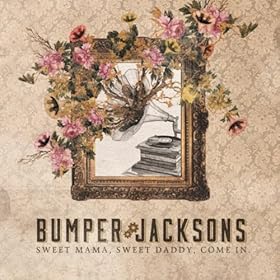|
Bumper Jacksons, Sweet Mama, Sweet Daddy, Come In (independent, 2014) I guess you could call the Bumper Jacksons a jug band or a hokum group or a trad-jazz ensemble, but then you'd have to add that they incorporate elements of Western swing and Appalachia, too, not to mention a pedal steel guitar ordinarily associated with mid-century honkytonk. However you categorize what they're doing, they're six young people from D.C. and the surrounding area, sufficiently enamored of the vernacular music of another time to dust it off and make it sound as recent as a few days ago. Unless you're the sort who objects to that sort of thing in principle, you will hear nothing to complain about in Sweet Mama, Sweet Daddy, Come In.
Even with the pedal steel the most purely jug-bandish piece here (there's an actual jug in it), "That's My Gal" carries the band back to the African-American folk music of the turn of the last century. It bears a relationship to the better-known "The Duck's Yas Yas Yas." Though credited to tradition, the tongue-in-cheek "Ragtime Millionaire" was almost certainly the creation of Mississippi bluesman William Moore, who recorded it in 1928. The arrangement of Cindy Walker's "Miss Molly" is distinctive enough, thanks to Dave Hadley's pedal steel and Brian Priebe's trombone, to diminish distracting thoughts of the well-traveled Bob Wills version, perhaps his most famous recording after "San Antonio Rose." Sweet Mama is sweet music indeed. The Bumper Jacksons probably are even more pleasing in performance. But if you can't see them live, they're as close as your CD player or equivalent. And if your listening memories stretch far enough to encompass the glory days of the Jim Kweskin Jug Band, know that the Bumper Jacksons bring the same joy and innovation to the sounds of a lost era of pre-rock 'n' roll popular music. 

|
 Rambles.NET music review by Jerome Clark 28 June 2014 Agree? Disagree? Send us your opinions!  



 |

